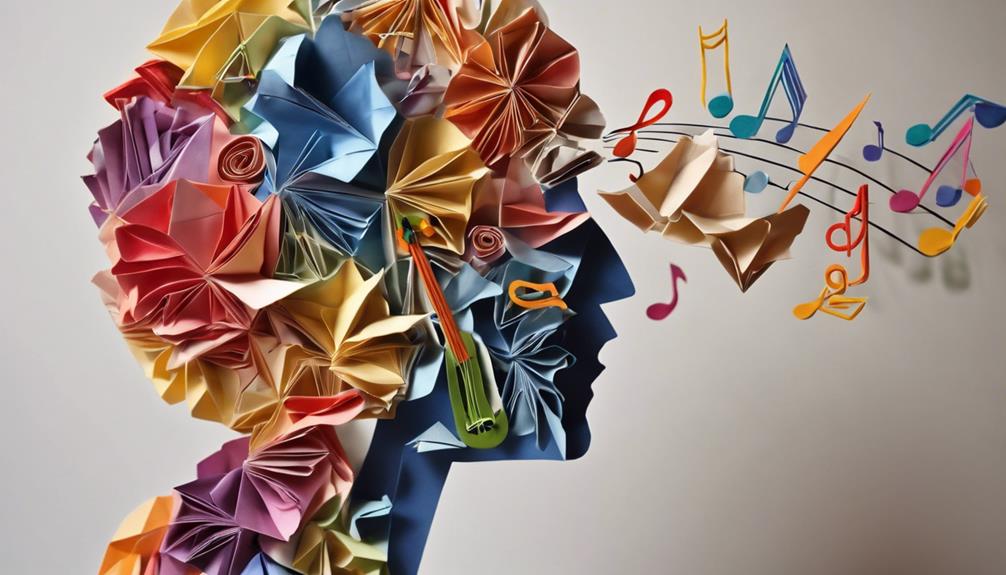Immerse yourself in the transformative power of music. Music not only has the ability to heal emotional wounds, but it also deeply influences and enhances various aspects of your life. Music therapy can improve mental well-being by helping with emotional regulation through the activation of the nucleus accumbens and dopamine levels (“Music Therapy Benefits”). Whether it’s emotional healing or cognitive enhancement, music serves as a reliable coping mechanism that promotes joy and relaxation (“Healing Through Sound”). Discover how music can profoundly impact building connections, reducing stress, and fostering overall well-being. Explore the ways in which music can heal and transform your life beyond your imagination.
Key Takeaways
- Music therapy enhances mental well-being and emotional regulation.
- Activating the nucleus accumbens boosts dopamine levels aiding in emotion regulation.
- Listening to music provides a safe space for expression and improves overall well-being.
- Music serves as a coping mechanism for mental health challenges.
- Recognizing music's therapeutic potential promotes emotional healing.
Music Therapy Benefits
Discover the transformative benefits of music therapy for enhancing mental well-being and emotional regulation. Music therapy plays a vital role in healing and supporting mental health by activating the nucleus accumbens in the brain, which boosts dopamine levels and aids in emotion regulation.
This therapeutic approach has been proven effective, particularly for young adults with limited access to resources for mental health treatment. By listening to music, individuals can find a safe space to express unspoken emotions and improve their overall well-being.
Music serves as a reliable coping mechanism for many young adults facing mental health challenges, offering solace and comfort in times of distress. Recognizing the therapeutic potential of music is essential for mental health support, especially considering the rising prevalence of mental health issues in society.
Embracing music therapy as a valuable tool in mental health treatment can provide individuals with a holistic approach to healing and emotional regulation.
Emotional Healing Through Melodies

Listening to music has a profound impact on your emotional well-being by activating the brain's pleasure center and boosting dopamine levels.
Music therapy has been shown to aid in emotional regulation and mental health treatment, offering a reliable coping mechanism during distressing times.
Recognizing the therapeutic potential of melodies is essential for promoting emotional healing and providing support for individuals processing complex emotions.
Mood Uplift With Music
Engage with the essential power of music to uplift your mood and experience emotional healing through melodies. Research has shown that music has a profound healing power, particularly in boosting dopamine levels in the brain. This boost in dopamine aids in emotional regulation, ultimately leading to mood uplift and emotional healing.
Listening to music has been proven to be an effective coping mechanism for individuals facing mental health challenges, offering solace and comfort during difficult times. According to the NAMI Blog, music plays a crucial role in emotional healing and reducing stigma surrounding mental health. NAMI advocates for mental health awareness through programs that focus on music therapy, recognizing the positive impact of music on mental well-being.
Healing Through Sound
Harness the profound impact of carefully selected melodies in music therapy to facilitate emotional healing and create a safe space for expression.
Music therapy is a powerful tool that promotes healing through the following ways:
- Anxiety Reduction: Research has shown that music therapy can notably reduce anxiety levels, providing a sense of calm and relaxation.
- Pain Alleviation: Through the use of therapeutic music, individuals can experience pain relief and enhanced comfort, improving their overall well-being.
- Mood Enhancement: Engaging with music in therapy sessions can lead to improved mood, offering individuals a sense of joy and positivity.
- Self-Expression: Music therapy enables individuals to express their emotions freely, fostering a deeper understanding of their feelings and promoting emotional release.
Cognitive Enhancement With Music

Listening to music can greatly enhance your focus, attention, and memory. Studies have shown that engaging with music therapy can aid in rehabilitation after brain injuries, helping to strengthen neural connections.
The structure and rhythm of music not only bring order but also promote brain health, offering a powerful tool for enhancing cognitive abilities.
Music and Focus
Enhancing your cognitive abilities through music involves leveraging its power to sharpen focus and mental acuity. Listening to music has been scientifically proven to enhance focus, attention, and cognitive function.
Here's how music can help improve your focus:
- Memory Retention: Certain genres and rhythms of music can enhance memory retention and learning abilities.
- Creativity Boost: Music has the ability to boost creativity and problem-solving skills in individuals.
- Productivity Enhancement: Incorporating music into study sessions or work environments can increase productivity and efficiency.
- Concentration Improvement: Using background music or specific soundtracks can promote better concentration and mental clarity.
Memory Boost Through Music
By immersing yourself in music, you can actively enhance your memory and cognitive abilities, experiencing a significant boost in mental sharpness and retention. Listening to music has been scientifically proven to improve cognitive function and attention span. Musical interventions play an essential role in enhancing learning and recall abilities across all age groups.
In particular, music therapy has shown promising results in stimulating memory retrieval and cognitive skills in individuals with conditions like Alzheimer's and dementia. Certain genres of music have the power to boost brain activity, aiding in information processing and retention. Engaging with music triggers various regions of the brain simultaneously, contributing to improved memory formation and recall.
As you listen to music, your brain becomes more active, strengthening neural connections associated with memory and cognitive processing. So, next time you're looking to give your memory a boost, consider turning to the power of music.
Building Connections Through Sound

Immersing yourself in collaborative music-making during therapy sessions can foster deep connections and relationships with others facing similar challenges. By engaging in group music sessions, you have the opportunity to build meaningful connections through sound, benefiting from the following:
Sense of Belonging: Music therapy offers a space where you can feel a sense of belonging and acceptance, creating a supportive environment for personal growth.
Communication Skills: Collaborative music-making nurtures communication and teamwork among participants, enhancing your ability to express emotions and thoughts effectively.
Supportive Bonds: Through music therapy, you can form supportive bonds with others, fostering a harmonious atmosphere where everyone's voice is valued and respected.
Emotional Expression: Group music sessions provide a safe outlet for emotional expression and self-discovery, allowing you to explore your feelings in a supportive and caring setting.
Through these connections forged in music therapy, you can experience transformative healing and growth, finding solace and understanding in the shared experiences of others.
Stress Reduction Techniques With Music

Listening to soothing music can greatly reduce stress levels and promote relaxation in individuals. Music therapy, a recognized stress reduction technique, harnesses the power of music to heal and transform one's emotional state.
Research has shown that calming music has the ability to lower stress hormones such as cortisol, leading to a sense of tranquility. Incorporating relaxation music into therapy sessions has been linked to decreased anxiety levels and improved mood.
Engaging with soothing melodies not only helps in managing stress effectively but also contributes to emotional well-being. By integrating music into daily routines, individuals can tap into a powerful tool for stress reduction.
Studies suggest that music interventions can aid in lowering heart rate and blood pressure, ultimately promoting overall stress reduction. Embracing music as a stress reduction technique can provide individuals with a holistic approach to improving their mental and emotional health.
Transformational Power of Music

Explore the transformative power of music in shaping your emotional and physical well-being through harmonizing vibrations and peace-inducing melodies.
Music has the ability to heal and transform by creating coherent vibrations that influence mental and physical balance, promoting a sense of peace within your mind and body.
When seeking to harness the healing properties of music, opt for soothing genres like Ayurvedic or Gandharva music known for their therapeutic effects on both body and mind.
To truly benefit from the transformative power of music, be mindful of your music choices, avoiding harsh or discordant sounds, especially during times when you're feeling fatigued or unwell.
Remember, the music you select can deeply impact your consciousness, leading to heightened spiritual awareness and enhanced emotional balance.
Choose wisely to allow music to guide you towards healing and emotional equilibrium.
Harnessing Music for Well-Being

Engage with the therapeutic benefits of music to enhance your overall well-being and emotional health. Music possesses a remarkable ability to heal and transform, impacting your mental state positively.
Studies reveal that music therapy stimulates the nucleus accumbens in your brain, leading to increased dopamine levels that contribute to enhanced therapy and emotion regulation. This process can be instrumental in promoting your well-being, offering a natural and effective means of healing.
Research further supports the efficacy of music therapy in treating various mental health conditions, underscoring its value as a resource for individuals seeking support. Particularly for young adults facing mental health challenges, music serves as a reliable coping mechanism, providing comfort and solace during difficult times.
Frequently Asked Questions
How Does Music Have the Power to Heal?
Music has the power to heal by reducing anxiety, alleviating pain, enhancing mood, and improving overall quality of life. Listening to music activates the brain's nucleus accumbens, boosting dopamine levels and aiding in therapy and emotion regulation.
What Is the Quote About the Healing Power of Music?
The quote about the healing power of music emphasizes how music can heal wounds that medicine cannot touch. It signifies the deep emotional and therapeutic impact music can have on individuals, offering solace and comfort.
How Does Music Change Your Life?
Like a gentle breeze on a hot day, music has the power to change your life. It uplifts your spirits, soothes your soul, and carries you through both the highs and lows with unwavering support.
What Type of Music Is Most Healing?
To heal, seek soothing music like classical or meditation chimes. Choose harmonizing vibrations for well-being. Avoid harsh music when tired or unwell. Gandharva Veda explores sound's impact on balance. Coherent music promotes peace and healing.
Can Music Help with Out of Body Experiences or Astral Travel?
Music has been used for centuries to aid in achieving an out of body experience ultimate astral travel. Certain frequencies and rhythms can help induce an altered state of consciousness, making it easier to disconnect from the physical body and explore the astral plane. Many believe that music can enhance and guide the experience.
Conclusion
To sum up, music has the remarkable power to heal, transform, and enhance our lives in countless ways.
Through music therapy, emotional healing, cognitive enhancement, building connections, and stress reduction techniques, we can harness the transformative power of music for our well-being.
Remember, as Plato once said, 'Music gives a soul to the universe, wings to the mind, flight to the imagination, and life to everything.'
So, let the melodies guide you on your journey to healing and transformation.









